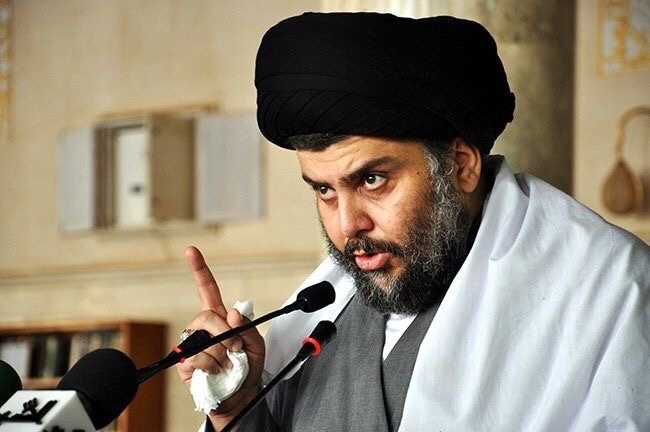Moqtada Sadr threatens Iraq PM-designate with ‘hell’
Thousands of anti-government demonstrators have already rejected his nomination as prime minister.
Monday 10/02/2020
Iraqi protesters chant slogans and wave national flags during an anti-government demonstration in the capital Baghdad’s central Tahrir Square on February 7, 2020. (AFP)
Iraqi protesters chant slogans and wave national flags during an anti-government demonstration in the capital Baghdad’s central Tahrir Square on February 7, 2020. (AFP)
Iraq’s incoming prime minister will face “hell” and be removed within days if he includes members of the political elite in his cabinet, a top aide to cleric Moqtada Sadr has warned.
Thousands of anti-government demonstrators have already rejected his nomination as prime minister.
Monday 10/02/2020
Iraqi protesters chant slogans and wave national flags during an anti-government demonstration in the capital Baghdad’s central Tahrir Square on February 7, 2020. (AFP)
Iraqi protesters chant slogans and wave national flags during an anti-government demonstration in the capital Baghdad’s central Tahrir Square on February 7, 2020. (AFP)
Iraq’s incoming prime minister will face “hell” and be removed within days if he includes members of the political elite in his cabinet, a top aide to cleric Moqtada Sadr has warned.
Premier-designate Mohammad Allawi has until March 2 to form a new cabinet, to be put to the protest-rocked country’s parliament for a vote of confidence.
Thousands of anti-government demonstrators have already rejected his nomination as prime minister.
Sadr, a former militia leader with millions of devoted followers across the country, first backed the rallies but split with the movement by endorsing Allawi last week.
Kadhem Issawi, a senior advisor to Sadr, insisted the new cabinet must not include members of the political elite — particularly Shianmilitary groups like the powerful Hashed al-Shaabi network, which rivals Sadr.
“If Sayyed (Lord) Moqtada hears that Allawi has granted a ministry to any side, specifically the Shia armed factions, Iraq will turn into hell for him and will topple him in just three days,” Issawi told a gathering including an AFP journalist late Saturday.
Sadr even rejected the appointment of members of his own movement to the government, Issawi said.
He said Sadr supporters would be willing to encircle Baghdad’s Green Zone, the high-security enclave housing government offices and foreign embassies, to ensure a non-partisan cabinet gets a vote of confidence.
Sadr has a long-standing rivalry with the Hashed, formed to fight the Islamic State group in 2014, as many of its members defected from his own movement.
In 2018, the cleric’s Saeroon parliamentary bloc joined forces with the Hashed’s political arm Fatah to form a shaky alliance that brought Adel Abdel Mahdi to the premiership.
But the partnership frayed, and two months after popular protests demanding government change erupted in October, Abdel Mahdi stepped down.
On February 1, Iraq’s bitterly divided political parties named Allawi as a successor but in private, government and security sources have expressed scepticism he will get his cabinet through the deeply-divided parliament.
Sadr immediately endorsed Allawi’s nomination as a “good step” but Issawi appeared to soften Sadrist support.
“We haven’t adopted Allawi. We just said we wouldn’t veto him,” he said.
Sadr has faced growing criticism by young anti-government demonstrators for a dizzying series of tweets recently in which he backed, then abandoned, then re-endorsed protests.
The cleric’s supporters, usually identified in protest squares by their blue caps, have raided rival demonstrators and the ensuing violence has left eight anti-government activists dead over the last week.
Issawi said Sadr still backed the rallies but alleged that drug use and other “moral” problems had tainted them.
“We’re against the protests being cleared out. We support their continuation but think they should be cleaned,” he said.
Issawi also laid down another red line: Sadr himself, who has a cult-like following in parts of Iraq.
“They want to insult the symbolism and holiness of Sayyed Moqtada? Impossible,” Issawi said.
(AFP)
No comments:
Post a Comment